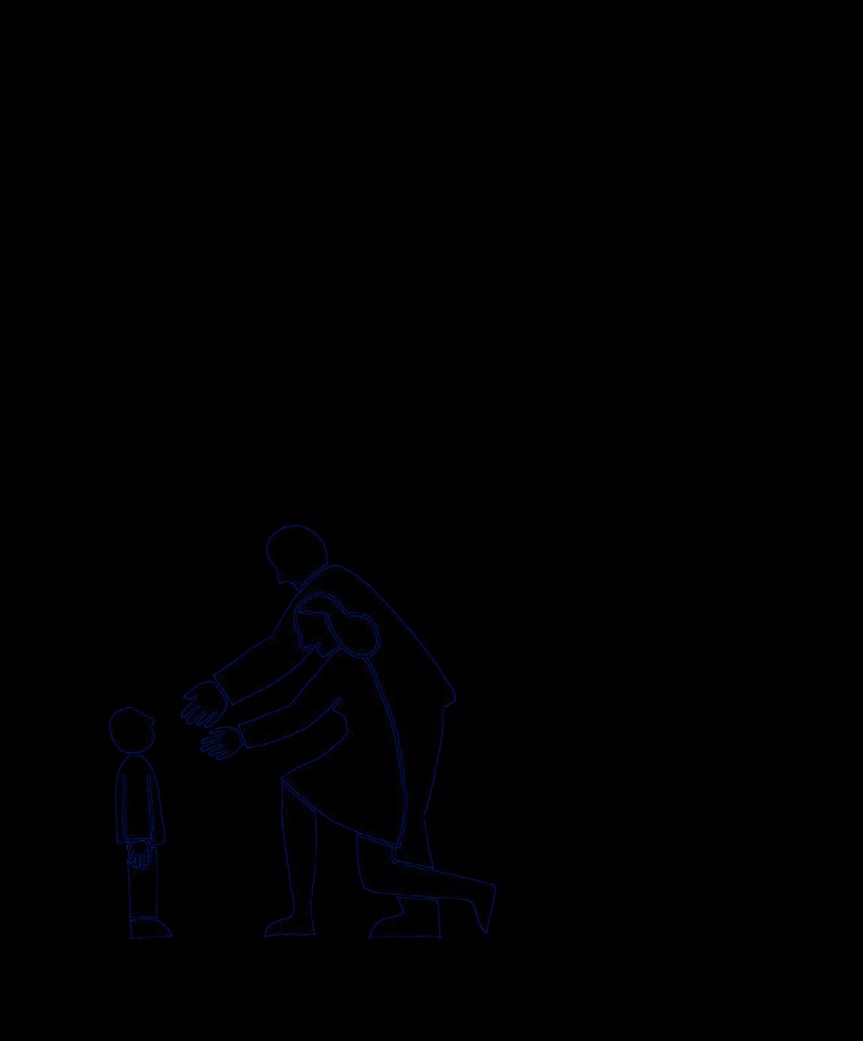The Psychology Book (37 page)
Read The Psychology Book Online
Authors: Unknown

116 FRITZ PERLS
perceived reality in the present
patient, who work together as
moment. This ability, to “be here
partners toward the goal. The
now” is critical to the Gestalt
therapist is dynamic but does not
process; it is an acute emotional
lead the patient; the Gestalt
awareness, and one that forms the
approach of Perls would later form
foundation for understanding how
the basis of Carl Rogers’ humanistic,
each of us creates and reacts to our
person-centered approach.
own environment. It also offers a
pathway for learning how to change
A denial of fate
the ways we experience ourselves
Another component in the Gestalt
and our environment.
method involves the use of language.
As a tool for personal growth,
One critical tool patients are given
the ability to get in touch with
for increasing self-awareness is the
authentic feelings—true thoughts
instruction to notice and change the
and emotions—is more important
use of the word “I” within speech.
Like Buddhism, Gestalt therapy
to Perls than the psychological
Perls says that to take responsibility
encourages the development of mindful
explanations or analytic feedback
for our reality, we must recognize
awareness and the acceptance of change
of other forms of therapy. The
how we use language to give the
as inevitable. Perls called change “the
“why” behind behavior holds
illusion that we have no control
study of creative adjustments.”
little significance for Perls; what
when this is not the case. By simply
is important is the “how” and
rephrasing “I can’t do that” to “I
responsibility for their perceived
“what.” This devaluing of the need
won’t do that,” it becomes clear that
sense of reality, they could create
to find out “why” and the shift of
I am making a choice. This also
the reality they wanted.
responsibility for meaning from
helps to establish ownership of
Perls helped his patients achieve
analyst to patient brought with it a
feeling; emotions arise in and belong
this through teaching them the
profound change in the therapist–
to me; I cannot blame someone or
integral processes of Gestalt therapy.
patient hierarchy. Where previous
something else for my feelings.
The first and most important process
approaches in therapy generally
Other examples of language
is learning to cultivate awareness
involved a therapist manipulating
change include replacing the word
and to focus that awareness on the
the patient toward the therapeutic
“should” with “want,” changing, for
feelings of the present moment.
goal, the Gestalt approach is
example, ”I should leave now” to “I
This allows the individual to directly
characterized by a warm, empathic
want to leave now.” This also acts
experience his or her feelings and
relationship between therapist and
to reveal the element of choice. As
Fritz Perls
Frederick “Fritz” Salomon Perls
thought. In the late 1960s, they
was born in Berlin at the end of
separated, and Perls moved to
the 19th century. He studied
California, where he continued
medicine, and after a short time in
to change the landscape of
the German army during World
psychotherapy. He left the US
War I, graduated as a doctor. He
to start a therapy center in
then trained as a psychiatrist, and
Canada in 1969, but died one
after marrying the psychologist
year later of heart failure while
Laura Posner in 1930, emigrated
conducting a workshop.
to South Africa, where he and
Laura set up a psychoanalytic
Key works
institute. Becoming disenchanted
with the over-intellectualism of
1946
Ego Hunger and
the psychoanalytic approach, they
Aggression
moved to New York City in the
1969
Gestalt Therapy Verbatim
late 1940s and became immersed
1973
The Gestalt Approach and
in a thriving culture of progressive
Eye Witness to Therapy

PSYCHOTHERAPY 117
Lose your mind and
come to your senses.
Fritz Perls
The 1960s hippie culture
chimed
with the Gestalt idea of finding oneself,
but Perls warned against the “peddlers
of instant joy” and the “so-called easy
road of sensory liberation.”
we learn to take responsibility for
With this personal responsibility
counter-culture revolution of the
our experience, Perls says, we
comes the obligation to refuse to
Western world. But this focus on
develop authentic selves that are
experience events, relationships,
individualism was seen by some
free from society’s influence. We
or circumstances that we know
psychologists and analysts as
also experience self-empowerment
to be wrong for our authentic
a weakness within the therapy,
as we realize that we are not at
selves. Gestalt theory also asks us
especially by those who view
the mercy of things that “just
to look closely at what we choose
human beings as, above all, social
happen.” Feelings of victimization
to accept among our society’s
beings. They claim that a life lived
dissolve once we understand that
norms. We may have acted under
along Gestalt principles would
what we accept for ourselves in our
the assumption of their truth for so
exclude the possibility of intimacy
lives—what we selectively perceive
long that we automatically accept
with another, and that it focuses
and experience—is a choice; we
them. Perls says we need instead to
too much on the individual at the
are not powerless.
adopt beliefs that best inspire and
expense of the community. In
develop our authentic self. The
response, supporters of Gestalt
ability to write our own personal
therapy have claimed that without
rules, determine our own opinions,
the development of an authentic
philosophies, desires, and interests
self, it would not be possible to
is of the essence. As we increase
develop an authentic relationship
our awareness of self-accountability,
with another.
self-reliance, and self-insight, we
In 1964, Perls became a regular
If you need encouragement,
understand that we are building our
lecturer at the Esalen Institute in
praise, pats on the back
own world, or truth. The lives we
California, becoming a lasting
from everybody, then
are living become easier to bear,
influence on this renowned center
you make everybody
because “truth can be tolerated
for spiritual and psychological
your judge.
only if you discover it yourself.”
development. After an explosion of
Fritz Perls
popularity in the 1970s, Gestalt
The possibility of intimacy
therapy fell out of favor, but its
Gestalt therapy’s emphasis on
tenets were accepted into the roots
“being in the present” and finding
of other forms of therapy. Gestalt is
one’s own path and one’s own ideas
today recognized as one of many
fitted perfectly within the 1960s
“standard” approaches to therapy. ■

118
IN CONTEXT
APPROACH
IT IS NOTORIOUSLY
Psychoanalysis
BEFORE
1900s
Sigmund Freud
INADEQUATE TO
suggests that neurotic
conflicts (and the superego)
arise in the Oedipal period—
TAKE AN ADOPTED
between ages three and six.
1930s
Melanie Klein claims
CHILD INTO ONE’S
that a primitive form of the
HOME AND LOVE HIM superego develops during the
first year of life, and that love
and hate are inherently linked.
DONALD WINNICOTT (1896–1971)
AFTER
1947
Psychologist and play
therapist Virginia Axline
develops her eight principles
of play therapy, which
include: “Accept the child
as she or he is.”
1979
Swiss psychoanalyst
Alice Miller says in
The Drama
of the Gifted Child
that we are
encouraged to “develop the art
of not experiencing feelings.”
M
any people believe that
if a child has suffered
an upbringing that was
lacking in love and support, he or
she will be able to settle and
flourish with a new family that
provides what is needed. However,
while stability and acceptance
help to give a foundation in which
a child can grow and find a healthy
state of being, these qualities
make up only one part of what
is required.
As the first pediatrician in
England to train as a psychoanalyst,
Donald Winnicott had a unique
insight into the mother-infant
relationship and the developmental
process of children. He was

PSYCHOTHERAPY 119
See also:
Sigmund Freud 92–99 ■ Melanie Klein 108–09 ■ Virginia Satir 146–47 ■
John Bowlby 274–77
Children originally
…so in defense, they
from neglectful or abusive
act out in hatred
, even
homes are
afraid that they
when placed with
will not be loved
by
good parents.
their adoptive family…
Donald Winnicott
If parents
This naturally evokes
The English pediatrician and
acknowledge their
feelings of
hatred in
psychoanalyst Donald Woods
hatred
and tolerate
the parents
.
Winnicott was the youngest
these feelings…
child and only son born to a
prominent, prosperous family
living in Plymouth, England.
